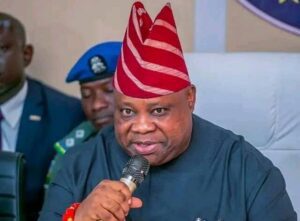
N4trn debt recovery: Don’t allow few individuals escape with our commonwealth — AMCON
For the umpteenth time, the Managing Director/CEO, Asset Management Corporation of Nigeria (AMCON) Mr Ahmed Lawan Kuru has reminded stakeholders to view the AMCON recovery mandate as one of serious national importance in the federal republic of Nigeria.
Kuru made the call over the weekend in two separate engagements with AMCON External Solicitors, and Receivers as well as Asset Management Partners (AMPs) in Lagos. He said the call has again become important because AMCON is not set up to operate in perpetuity as the Corporation has a sunset period thus the need to apply speed in the collective recovery assignment.
The AMCON CEO who was represented at the interactive sessions by Mr Benedict Daminabo, the Group Head, Asset Management Directorate in the Corporation said if at sunset AMCON is unable to recover the huge debt, which currently stands at over N4trillion, it becomes the debt of the Federal Government of Nigeria, which he said would have huge implication on the taxpayers’ monies.
As a result, he said the positive debt recovery history of AMCON cannot be fully told by chroniclers of financial and economic history in Nigeria without some critical stakeholders such as AMCON Solicitors and indeed the entire Nigeria judiciary as well as Receivers; and the Asset Management Partners (AMPs) that have become major tools in the recovery efforts of AMCON. He described the engagement, which is AMCON’s first major interaction with stakeholders in 2023 in Lagos as very important, and strategic to the recovery efforts of AMCON.
“We (AMCON) value our relationship with all our stakeholders, and we will continue to interact, share experiences and brainstorm on the best ways for the Corporation to succeed in this national assignment. Feedbacks received from interactions with our various stakeholders’ overtime, and particularly from Honourable Judges from the various Courts necessitate continuous training and retraining of our stakeholders especially as it relates to challenges encountered during filling processes in Court and enforcing AMCON’s rights on obligors’ assets.
“Also, considering that the Corporation has begun to put measures in place for eventual wind down of its activities as it is not created to remain in perpetuity, we see working and collaborating with all our stakeholders as a matter of priority. The success of AMCON would not be adequately recorded without recognising the roles played by of all stakeholders. That is why we consider our interaction with you as one of the road maps to the success story of AMCON. Like we always mention repeatedly in and at every opportunity that all stakeholders must view the AMCON mandate as one of serious national importance. AMCON is not set up to remain in perpetuity, it has a sunset period. If at sunset AMCON is unable to recover the huge debt of over N4trillion, it becomes the debt of the Federal Government of Nigeria for which taxpayers’ monies will be used to settle.”
According to him, “The implication is that the public will be made to pay for the recklessness of only a few individuals who continue to take advantage of the loopholes in our laws to escape their moral, and legal obligations to repay their debts. We should not allow a few individuals to escape with our commonwealth. And we want to do it within the confines of the law.
“It is pertinent to mention that we have had course to disengage some of our Receivers and External Solicitors due to non-performance. The same thing applies to our AMPs who are not performing optimally. However, we strongly believe that majority of our stakeholders have shown impressive resourcefulness in reaching obligors who have not been reached before now. Also, their ability to trace assets of obligors has been quite impressive. Therefore, it is our hope that our external solicitors and Receivers, and AMPs would keep the on-going momentum so as to achieve more recovery milestone.
“However, we are greatly concerned about the frequency of adjournment of our matters which on several occasions is as a result of non-appearance of our lawyers. This is causing us a lot of embarrassment within the judicial space. We are also worried about the number of assets that are been abandoned by our Receivers. These actions are causing the Corporation so much embarrassment, especially as we know these assets had been entrusted in the hands of the Receivers. We therefore urge you to adhere to the sanctity of contract we have with you. Treat our matters with utmost professionalism, diligence, commitment, and duty of care.”
Others who made presentations at the engagements organised by Dr Fatihu Abba-led Legal Academy include Mr Mitchell Aghatise from the firm of Olaniwun Ajayi who represented Mr Muyiwa Balogun; Dr Danjuma Umar, Head, of Receiverships, AMCON, Mr Robert Odihi from Dele Oye & Associates, Abuja; Mr Godwin Omoaka, SAN, FCIArb., and Senior Partner in the Dispute Resolution practice group of Templars Barristers and Solicitors; Mrs Rukevwe Smatt-Oni, Head of Department, AMP Enforcement; Mr Brian Ike-Echie of AMCON Legal Department, and Aisha Abioye of IT Department, AMCON.



